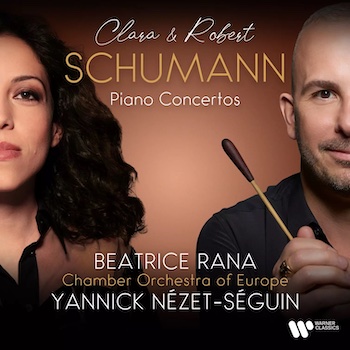Classical Music Album Review: Beatrice Rana plays Schumann
By Jonathan Blumhofer
Pianist Beatrice Rana, joined by the Chamber Orchestra of Europe and conductor Yanick Nézet-Séguin, plays the daylights out of Clara Schumann’s Piano Concerto in A minor.
 Robert Schumann’s Piano Concerto in A minor is one of the cornerstones of the repertoire. Much less familiar is the other Schumann Piano Concerto in A minor – namely the one written by Robert’s future wife, Clara Wieck, when she was just fourteen years old.
Robert Schumann’s Piano Concerto in A minor is one of the cornerstones of the repertoire. Much less familiar is the other Schumann Piano Concerto in A minor – namely the one written by Robert’s future wife, Clara Wieck, when she was just fourteen years old.
Often held to be little more than a curiosity, Clara’s opus gets top billing in Beatrice Rana’s new recording (Warner Classics) of the couple’s keyboard concerti. Here’s the kicker: the piece holds its own with its better-known mate.
To be sure, Clara’s effort is the work of a talented composer rather than an established master in the field. Among other things, its structure is uneven: the first movement is too short, the last too long.
Even so, the highly virtuosic keyboard part is astonishingly fluent and idiomatic. Parts of it – like the dreamy, rhapsodic swathes of the first two movements – evoke the specter of Chopin with their rhythmic flexibility. And there are beguiling little touches in the orchestration (notably, the second movement’s solo cello accompaniment and rumbling timpani just before the onset of the finale).
Rana, who’s joined by the Chamber Orchestra of Europe (COE) and conductor Yanick Nézet-Séguin, plays the daylights out of it. Her take on the opening Allegro maestoso is clean, shapely, and well-directed. So, too, the Romanze, with its huge dynamic range and close attention to shadings of instrumental color.
In the finale, there’s an agreeable lightness to Rana’s execution of the octave runs, as well as a charming realization of the music’s dialogues between soloist and orchestra over the movement’s last third. Ultimately, we’ve got an interpretation here that brilliantly illuminates the poetic, dramatic essence of the solo writing as well as the conversational aspect of the Concerto’s instrumentation.
The performance of Robert’s Concerto that follows is likewise well-played and voiced, though it is also stiffer and fussier moment-to-moment. That’s especially true of the orchestral playing in the Allegro affettuoso; the COE’s mid-movement phrasings here border on the pedantic.
Things improve in the warmly flowing second movement while the finale – fresh, unpretentious, and vigorous – sounds much more like the pairing’s best moments in Clara’s Concerto. Overall performance the movement is strongly shaped (especially the solo line) and limber.
Rounding things out is Franz Liszt’s arrangement of Robert’s song, “Widmung.” Rana makes seemingly effortless work of it while also imbuing the cascades of running notes with a remarkable degree of elegance and poetry.
Jonathan Blumhofer is a composer and violist who has been active in the greater Boston area since 2004. His music has received numerous awards and been performed by various ensembles, including the American Composers Orchestra, Kiev Philharmonic, Camerata Chicago, Xanthos Ensemble, and Juventas New Music Group. Since receiving his doctorate from Boston University in 2010, Jon has taught at Clark University, Worcester Polytechnic Institute, and online for the University of Phoenix, in addition to writing music criticism for the Worcester Telegram & Gazette.
Tagged: Beatrice Rana, Chamber Orchestra of Europe, Warner Classics
